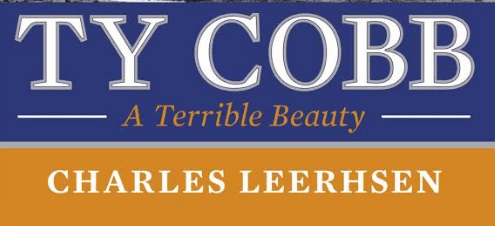Great Lives: Ty Cobb wasn’t the violent racist you thought
3 min read
UMW Relations
By ETHAN TOBIN
Have you ever wondered how baseball’s “greatest of all-time” was also deemed a violent racist, who was known for spiking his cleats with the intent of sliding in hard on the opponent, yet set the standards for the Baseball Hall of Fame? If so, you’ve got the 1900s baseball legend Tyrus Raymond “Ty” Cobb to thank.
University of Mary Washington students, faculty, Fredericksburg community members and baseball enthusiasts heard all about Cobb on Feb. 14 when they filled Dodd Auditorium for a lecture by Charles Leerhsen, author of the “New York Times” bestseller “Ty Cobb: A Terrible Beauty.”
Leerhsen, a prominent sports writer who has written for high profile magazines including “Sports Illustrated,” “Smithsonian” and “Rolling Stone” to name a few, spoke as part of the Crawley Great Lives Lecture series. He shared information about Cobb’s early life in Brooklyn, the criticisms he received for his troublesome behaviors on and off the field and most importantly how he earned the title of “greatest of all-time.”
Out of the gate, Leerhsen addressed the controversies and preconceived assumptions of Cobb that were based on little proof yet had a dramatic impact on his reputation and playing career. Central to his lecture, which was also the topic of his book, Leerhsen was critical that the poor reputation of Cobb had been formed overtime, was a result of negligent research and reporting that hardly lacked any truth. For the remainder of the lecture, Leerhsen focused on debunking the popular myths of the “evil” Ty Cobb. “Many writers over the years who focused on Cobb went for low-hanging assumptions.
That he was violent towards black people, that he filed down the spikes on his cleats before each game and slid hard into bases. How could someone born in Georgia in 1886 not be a racist? Many of these writers were working off of little to no factual evidence,” Leerhsen said.
Leerhsen began to break down each argument one by one in order to come to conclusion that Cobb was not the villain he was made out to be.
“In fact Ty Cobb ascended from a long line of abolitionists. His grandfather had been run out of town at one point for his stance on equal rights and his father once broke up a lynch mob in the town,” Leerhsen said.
With the frequent reference to documented evidence, most notably letters written by Cobb and others who knew Cobb, Leerhsen continued to prove that Cobb was in fact a good person.
Although Leerhsen admitted that Cobb was by no means a perfect human being, noting that Cobb had thin skin when it came to criticism, occasionally got into scuffles, and was an aggressive base-runner. He wasn’t the bigoted racist that he was portrayed as in the majority of late 1900s sports writing.
“He attended many negro games and often threw out the first pitch in Negro League games,” Leerhsen said. “He was one who believed wholeheartedly that blacks should be allowed to play professional baseball.”
In his final note over the many critiques surrounding the live of Cobb, Leerhsen emphasized that, “The fact that you’ve heard something a million times doesn’t make it true. A man’s reputation was destroyed and his legacy obliterated.”
At the conclusion of Leerhsen’s speech, audience members erupted with applause. During the post lecture period in which the audience was granted time to ask questions, many audience members expressed their appreciation for having clarified their wrongful preconceived notions of Cobb.
Amongst the crowd was senior Sean Kinslow. Like Kinslow, many audience members felt Leerhsen delivered an engaging lecture.
“I think the speaker did a good job of explaining his research and how his methods were superior to those of his peers. Before this lecture, I thought of Ty Cobb as one of the best baseball players of all time, with a checkered past,” Kinslow said. “Now I see Cobb as a baseball legend whose personality is often misrepresented by sports media.”











